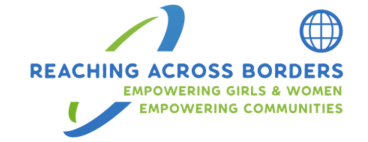“Mental Health pain is often the invisible and untreated
Injury of Oppression.”
–Raiza Kolia
Mental Health and Psychosocial Support Services (MHPSS)
Empowering vulnerable communities
Prologue
The importance of Mental Health (MH): According to the US Centers for Disease Control and Prevention (CDC), Mental Health is an important part of overall health and wellbeing. Mental Health includes our emotional, psychological, and social wellbeing. It affects how we think, feel, and act. It also helps determine how we handle stress, relate to others, and make healthy choices. Mental Health is important at every stage of life, from childhood and adolescence through adulthood
The COVID-19 Pandemic: COVID-19 has caused hardships to all of us, even those of us who are fortunate to live in the best of circumstances. However, it is not the “Great Equalizer”, and so you can only imagine the hardships refugees are facing during this pandemic. They find themselves stateless, homeless, living in cramped conditions, with limited access to employment and educational opportunities, clean running water, hygiene products for women and children, etc. Reaching Across Borders is fortunate to have unprecedented access and relationships in the community where we provide services. Using our access and services, we have a captive audience, which allows us to provide COVID-19, health, and hygiene education, and advocacy of the benefits of getting vaccinated when the vaccine is available to them. We use every touch (encounter) that we have with our beneficiaries to add a component of COVID-19 and vaccination education, regardless of whether we are providing one-on-one therapy, conducting Psychosocial Support, Mental Health, or domestic violence awareness sessions. We are committed to helping our community heal from their Mental Health stressors and from this pandemic.
~~~
Our Mental Health and Psychosocial Support (MHPSS) team is dedicated to providing MHPSS services to individuals, families, and communities in diverse settings, that have been exposed to conflict and displacement, political oppression, torture, and gender-based violence.
What is MHPSS?
The term “Mental Health and Psychosocial Support” (MHPSS) describes any type of support that aims to protect and promote psychosocial wellbeing and/or prevent or treat mental disorders for people in crisis situations.
The Psychological and Social Impacts of War and Displacement
People living in conflict-affected areas are three times more likely than the general population to suffer from conditions such as depression and anxiety, post-traumatic stress disorder, etc., yet they are least likely to seek mental health services.
The psychological and social impacts of war and displacement may be acute in the short term, but they can also undermine the long-term mental health and psychosocial wellbeing of the affected population.
The impacts of war and displacement threaten peace, human rights, and social development for generations to come.
The MHPSS needs among refugee communities and Internally Displaced People (IDPs) globally by far exceed the amount of services offered, and despite many MHPSS services provided by state and non-state organizations, there is limited capacity. Even when these services are available, many refugees are most likely unable to access to them.
Our Goal
Our goal at the Reaching Across Borders is to increase access to MHPSS services for vulnerable communities, such as refugees or IDPs; and to build individual and community resilience and economic empowerment among the communities we serve.
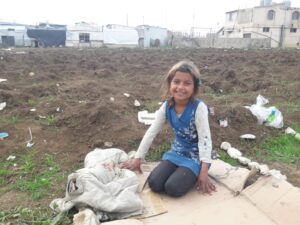
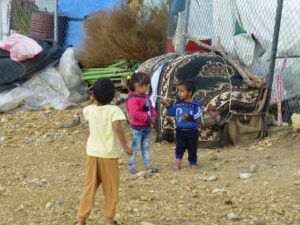
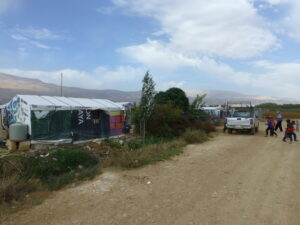
The Bekaa Valley, Lebanon
Our current MHPSS services are being provided in the Bekaa Valley, Lebanon, with Syrian and Palestinian Refugees and vulnerable Lebanese. The Bekaa Valley is in the East of Lebanon and borders to the West of Syria; it has the largest concentration of Syrian refugees in Lebanon; unofficial numbers are around 800,000.
The Life of Syrian Refugees in Lebanon
The protracted war and long-term refugee reality has left Syrian refugees with many losses. Now more so than ever, a sense of helplessness and hopelessness is having a profound impact on their mental health and emotional copying abilities, long-term resilience, and forcing them into a life of abject poverty.
This crisis is having long-term effects on adults and children’s physical and mental health, their professional and economic wellbeing, and their cultural and personal lives. All this will have severe negative impacts on future generations.
At this point, Syrian refugees have been displaced for many years. The label of “refugee” is firmly imprinted on them and, sadly, it is being treated as their “identity” rather than a circumstance.
Other damaging factors include:
- Grim Future: Many children are born into refugee families and have never been to their country of origin. They are growing up without any prospects of a future.
- Labeling: Others left their country of origin as children and are now becoming teenagers and young adults growing up in foreign land, with the label of “refugee” imprinted on them, again with very few and, at best, uncertain prospects.
- Few Opportunities for Basic Education: Most host countries cannot provide sufficient primary and secondary education for the refugee youth. The young generation of the refugee population is becoming our “lost” generation.
- Robbed of Reaching True Potential: Still others had their higher and professional education interrupted and are now in foreign lands without completing their university education or fully developing their professional skills and reaching their true potential.
- Scattered Families: Families have been separated for years and are now scattered in different countries. For many refugees, their family and community which used to be their social network, traditionally providing a strong safety-net, no longer exists.
- Changing Family Roles: Family roles are changing or, rather, have already changed, because of the lack of economic opportunities. For example, typically, many more young girls or women can find low-income work, while the men are not able to find any gainful employment. This is making the women the key breadwinners in many refugee families.
- War is All Some Know: Now, multiple generations are growing up, knowing only war or a conflict situation as the reality in their home country.
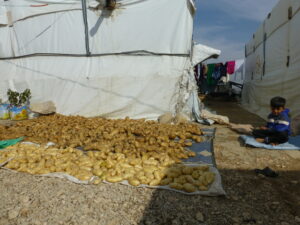
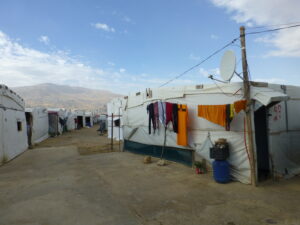
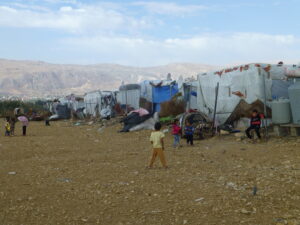
Our Services
- Tele-psychiatry, MH consultation, and medication management. We do psychological assessments using the APA standardized and validated assessments tools as well as an intake assessment tools such as the Hopkins Symptom Checklist – 25 (HSCL-25) and the Harvard Trauma Questionnaire (HTQ), to assess trauma, anxiety, depression, and PTSD in patients. Based on the results, prioritize interventions.
- Individual therapy, including speech therapy and therapy with autistic children. We provide individual therapy, using a variety of intervention methodologies and techniques. When needed, we refer patients to our social workers for case management referrals. Regarding speech therapy, our psychologists will assess, diagnose and provide treatment using the Autism Spectrum Disorder (ASD) scale.
- Psychosocial Support (PSS) programs: We will provide group-based PSS program. Our PSS programs target men, women, teenagers, and children. All programs have a pre-test and post-test to assess impact and to continuously improve our programs.
- Awareness/psycho-education sessions: Our psychologists and social workers provide awareness sessions on early marriage and gender-based violence (GBV). We also provide psycho-education sessions on relevant mental health topics.
- Case Management: Our social workers provide comprehensive case management services to ensure that our beneficiaries are accessing the services available to them. We are committed to navigate the barriers our beneficiaries face when seeking services outside of our Center.
- Economic Empowerment: During our individual therapy, tele-psychiatry, and awareness sessions, identify women who meet the criteria for our economic empowerment vision. We work with these women to identify the appropriate vocational training program for them. We help them enroll in the program of their choice, provide material support and motivation throughout the program, and post-training we support them to achieve economic empowerment.

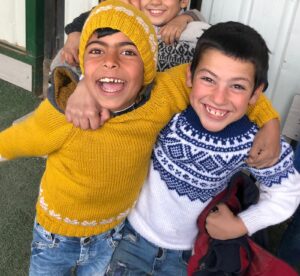
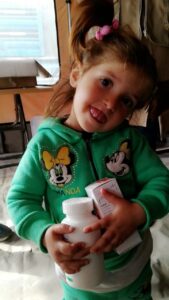
Our Service During the COVID-19 Pandemic
During the COVID-19 pandemic, or any other unforeseen circumstances, we can provide most of our services remotely. Our customized approach allows us to reach and engage with our beneficiaries using telecommunication technology.
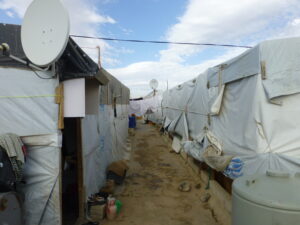
What Is Unique About Our Program?
- Accessibility: We provide all our MH educational services in the communities where people live. We partner with other organizations where refugees or IDPs access other services such as computer literacy classes, vocational training, multispecialty clinics, maternity clinics, etc., and at schools.
- Our Team: We partner with the local community and refugee community to ensure a customized approach to our services. Our team members are from the communities we serve. This is critical to our success because our local team better understands the culture, the challenges of war and displacement, and the stigma associated with mental health issues within their societies. All of this ensures that we provide services and educational materials that are culturally sensitive, professional, and effective.
- Professionalism and Evidence-based Programs: All our educational materials and our MHPSS programs are based on evidence-based research and practice. We collaborate with MH professionals and academics globally to develop our content and to advise our work.
When the environment allows, we bring our beneficiaries to our Center or take them to another venues so that they can get a change of environment from their usually depressing realities.
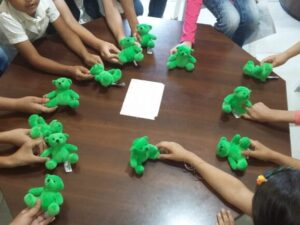
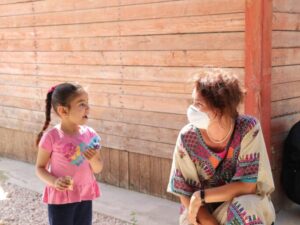
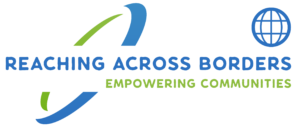
Humanitarian services for vulnerable communities, by community members.
Reaching Across Borders is a 501(c)(3) tax-exempt nonprofit humanitarian services organization.
USA Tax ID / EIN: 85-2397845.
All donations are tax-deductible in the USA to the full extent allowable under IRS regulations.
